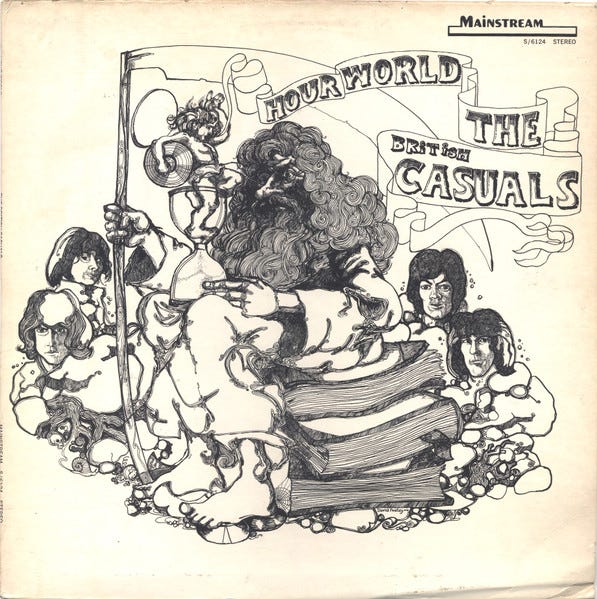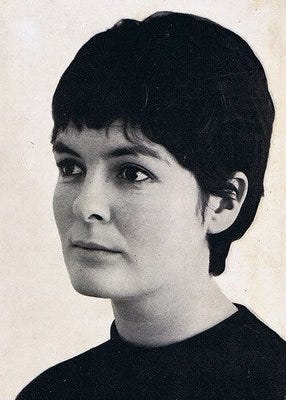
Known to the few in America as The British Causals and to the few otherwhere as just The Causals. A band that, as far as I can gather, has absolutely no interest in the world whatsoever. The joys of going to a record shop and finding an album like this one are the multitude of layers of happiness and curiosity. Plus, having an ugly and dated cover, even at its time of release in 1969, is an accessible record to pass or ignore. But my friend Nick and I fought over the record because it must be of some interest and perhaps even a masterpiece just by its presence.
When we took the album Hour World to my home, we did a quick research on the band. The right-a-way interest is that Bill Price, who worked on The Clash and Sex Pistols, engineered some of these recordings. There are numerous engineers listed on the back cover as well as five arrangers, two that I know of are Arthur Greenslade, who did masterful work with Serge Gainsbourg, and Reg Guest, a key figure in the British Invasion years, as well as working with my beloved Dave Berry recordings. 1969 was an interesting year in British music where many bands/artists started to get heavy in their late psychedelic sounds, but primarily generating a hard rock image and identity. The Causals, on the other hand, were twee in a time of heaviness, and of course, with the known arrangers involved (there are five altogether), this is very much an album of heavy orchestration and production. Which, by the way, is from a fellow named Dave Pardo. The only information I can gather is that The Causals, although British, moved to Spain. Pardo is a music person who also went to Spain to do records, and beyond that, he disappears into the mist of time and space, like the members of The Causals.
They sound like The Move if Carl Wayne fought against Roy Wood’s adventuresome noise and won out with his pure pop taste. But still highly eccentric, and although this album is far-out, it is still very much dated of its time compared to, say, Led Zeppelin, whose first album was released that year. They also cover The Association’s Never My Love and Harry Nilsson’s Daddy’s Song, but most of the material comes from other sources, with one band member John Tebb writing a couple of their songs. Those who adore the early Bee Gees in their psych moment will find this album worthy.
The other reason why I picked up on this album is the record label Mainstream Records. I only know of them because they also released serious avant-garde experimental works by John Cage, Morton Feldman, and Earle Browne, the main A&R person for their experimental side. I wasn’t aware of a pop music side to the label until I came upon Hour World. But there are musique concrete touches throughout the album, so one has to presume that Pink Floyd was aware of this release because they used this approach to sound effects for their The Dark Side of The Moon.
Hour Music is an album made by recording engineers, arrangers, and a producer. This is a plus because I’m fascinated with the mechanics of British pop commercial music of the 60s and 70s. The leading track, Jesamine, has Paul Weller as a fan, but was it ever an actual hit? The more I play the album, the more I feel that love is taking over because I suspect that only a few would even admire this album. Easy listening in that Sunshine Pop mode, but with touches of light psych that make one think that there is something more. But I’m sure that is just my overactive imagination.
I just finished reading Ann Quin’s novel Berg, which is a perfect read for a rainy Los Angeles. Since it takes place in Brighton Beach, UK, it shares a mood. I want to thank Dennis Cooper for the recommendation for her books. You can read the Dennis blog here on Quin:
















Tosh, thanks for this review! I’ve got Hour World on repeat :). Calming... like... palm trees, Baird
Funny you should mention The Move. Seems Roy Wood wrote and produced this track for them. If I didn’t know better, I’d say this is Wood himself singing.
https://youtu.be/sq1iaclFSNw